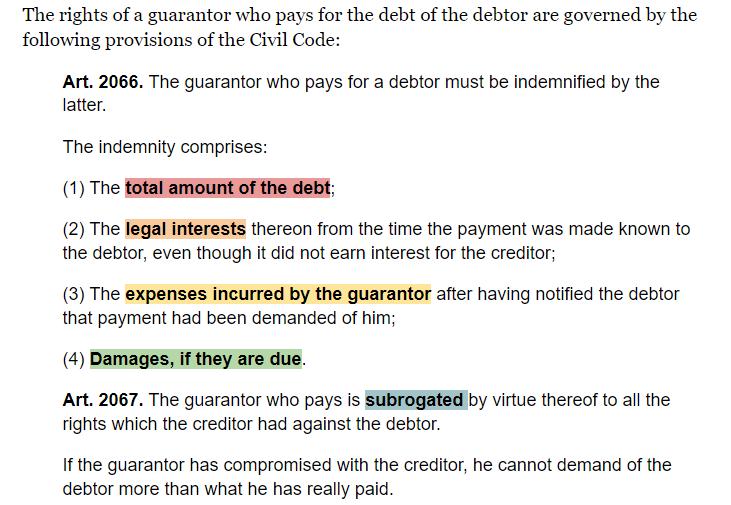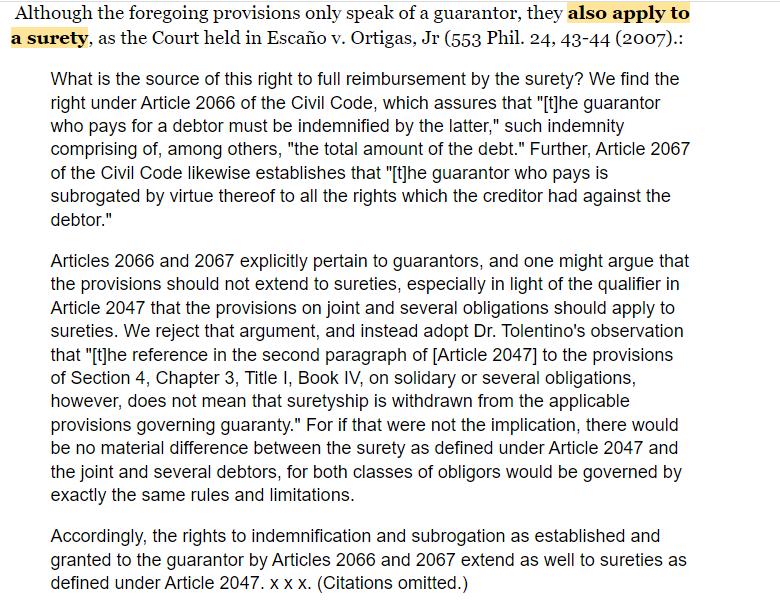Answered step by step
Verified Expert Solution
Question
1 Approved Answer
The rights of a guarantor who pays for the debt of the debtor are governed by the following provisions of the Civil Code: Art.


The rights of a guarantor who pays for the debt of the debtor are governed by the following provisions of the Civil Code: Art. 2066. The guarantor who pays for a debtor must be indemnified by the latter. The indemnity comprises: (1) The total amount of the debt; (2) The legal interests thereon from the time the payment was made known to the debtor, even though it did not earn interest for the creditor; (3) The expenses incurred by the guarantor after having notified the debtor that payment had been demanded of him; (4) Damages, if they are due. Art. 2067. The guarantor who pays is subrogated by virtue thereof to all the rights which the creditor had against the debtor. If the guarantor has compromised with the creditor, he cannot demand of the debtor more than what he has really paid. Although the foregoing provisions only speak of a guarantor, they also apply to a surety, as the Court held in Escao v. Ortigas, Jr (553 Phil. 24, 43-44 (2007).: What is the source of this right to full reimbursement by the surety? We find the right under Article 2066 of the Civil Code, which assures that "[t]he guarantor who pays for a debtor must be indemnified by the latter," such indemnity comprising of, among others, "the total amount of the debt." Further, Article 2067 of the Civil Code likewise establishes that "[t]he guarantor who pays is subrogated by virtue thereof to all the rights which the creditor had against the debtor." Articles 2066 and 2067 explicitly pertain to guarantors, and one might argue that the provisions should not extend to sureties, especially in light of the qualifier in Article 2047 that the provisions on joint and several obligations should apply to sureties. We reject that argument, and instead adopt Dr. Tolentino's observation that "[t]he reference in the second paragraph of [Article 2047] to the provisions of Section 4, Chapter 3, Title I, Book IV, on solidary or several obligations, however, does not mean that suretyship is withdrawn from the applicable provisions governing guaranty." For if that were not the implication, there would be no material difference between the surety as defined under Article 2047 and the joint and several debtors, for both classes of obligors would be governed by exactly the same rules and limitations. Accordingly, the rights to indemnification and subrogation as established and granted to the guarantor by Articles 2066 and 2067 extend as well to sureties as defined under Article 2047. x x x. (Citations omitted.)
Step by Step Solution
★★★★★
3.39 Rating (161 Votes )
There are 3 Steps involved in it
Step: 1
It is found in Article 20 67 of the Civil Code Art 20 67 The guarant or who pays is sub rog ated ...
Get Instant Access to Expert-Tailored Solutions
See step-by-step solutions with expert insights and AI powered tools for academic success
Step: 2

Step: 3

Ace Your Homework with AI
Get the answers you need in no time with our AI-driven, step-by-step assistance
Get Started


